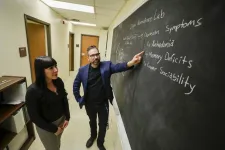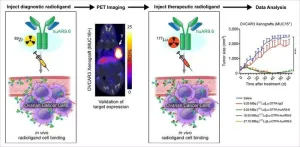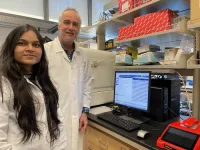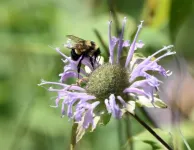(Press-News.org) EL PASO, Texas (April 4, 2024) – Psychology researchers at The University of Texas at El Paso are making progress towards understanding the biological underpinnings of depression, a leading cause of disability that affects approximately 280 million people around the world.
In a study published this April in the Journal of Affective Disorders, UTEP psychologist Sergio Iñiguez, Ph.D., and his co-authors make the case that prairie voles, small rodents that are found throughout the central United States and Canada, can be effectively used as animal models to further the study of clinical depression.
“The findings of this investigation are important because we show, for the first time, that prairie voles display some of the core symptoms of depression after chronic stress exposure – just like humans,” Iñiguez said. “This is exciting because we can now use this animal model to potentially uncover the biological factors that underlie illnesses like depression and anxiety.”
The UTEP study focuses on the impact of “bullying” on voles’ behavioral patterns. Researchers observed what happened when individual male voles were bullied by more aggressive males over the course of ten days, inducing what Iñiguez refers to as “social defeat stress.”
Iñiguez explained that that the voles who were bullied exhibited changes in body weight, performed worse on spatial memory tests and were less sociable with other voles compared to those who were not bullied. Where voles generally show a preference for sugar water, the bullied voles showed no preference when given a choice between regular water and sugar water, a pattern known as anhedonia, or loss of pleasure in regular activities, Iñiguez said.
Iñiguez and his fellow researchers concluded that “social defeat” activated the voles’ stress response and became a risk factor for symptoms that mirrored those of depression in humans.
Iñiguez, a professor in the Department of Psychology at UTEP who studies behavioral neuroscience, said that while depression has certain defining characteristics—such as sadness, lack of pleasure in normal activities, and disruption in sleep and eating patterns—researchers don’t yet have a full picture of what causes it.
“We have some information about the many factors that contribute to depression, but the ethical implications of doing neurobiological research in humans make it difficult to pinpoint the biology behind this debilitating condition,” Iñiguez said.
Rats and mice are often used in psychology studies, but prairie voles share several unique characteristics with humans that make them better candidates for research, such as having monogamous relationships, raising vole pups in pairs, and even taking on parental roles for orphaned pups.
Psychology doctoral student Minerva Rodriguez is the lead author of the study.
“These unique and special animals have opened doors to understanding aspects of depression we simply could not with mice and rats,” Rodriguez said. “Their distinct social behaviors provide fresh research avenues, demonstrating the prairie vole's immense value as a model for delving into the neurobiology of social stress-induced depression."
Future studies will examine how the voles rebound from depression-like experiences and how they respond to antidepressant medications like Prozac or ketamine.
The project is funded by a grant from the National Institutes of Health.
About The University of Texas at El Paso
The University of Texas at El Paso is America’s leading Hispanic-serving university. Located at the westernmost tip of Texas, where three states and two countries converge along the Rio Grande, 84% of our 24,000 students are Hispanic, and more than half are the first in their families to go to college. UTEP offers 172 bachelor’s, master’s and doctoral degree programs at the only open-access, top-tier research university in America.
END
UTEP study: prairie voles display signs of human-like depression
Critters can be used to better understand depression
2024-04-04
ELSE PRESS RELEASES FROM THIS DATE:
Researchers envision sci-fi worlds involving changes to atmospheric water cycle
2024-04-04
Human activity is changing the way water flows between the Earth and atmosphere in complex ways and with likely long-lasting consequences that are hard to picture.
Land use change is altering where clouds form and how precipitation is distributed. Meanwhile, weather modification activities like cloud seeding are shifting how nations plan for water use in the face of climate change. These and other changes to the planet’s atmospheric water cycle were once hard to imagine but are increasingly part of modern water management on the planet.
Colorado State University Assistant Professor Patrick Keys is an expert ...
Novel theranostic tool allows for noninvasive identification and treatment of ovarian cancer
2024-04-04
Reston, VA—A new radiotheranostic system has the ability to detect and treat ovarian cancer noninvasively, according to new research published in the April issue of The Journal of Nuclear Medicine. Combining the highly specific huAR9.6 antibody with PET and therapeutic radionuclides, this theranostic platform may provide more personalized treatment to improve health outcomes for ovarian cancer patients.
Ovarian cancer causes more deaths than any other gynecologic malignancy, with a five-year survival rate below 30 percent for patients diagnosed at advanced stages. The current standard of care for ovarian cancer consists of surgery followed by platinum-based chemotherapy; however, ...
An NSF bootcamp for future scientists
2024-04-04
Research today doesn't only occur in a lab; indeed, many university researchers extend their work into the community with the goal of inspiring the next generation of scientists and engineers. And some government agencies, like the National Science Foundation, provide the funding to do so. Most recently, Xiayun Zhao, assistant professor of mechanical engineering & materials science at the University of Pittsburgh, completed such outreach at the Carnegie Science Center (CSC).
Zhao ...
Small protein plays big role in chronic HIV infection
2024-04-04
RIVERSIDE, Calif. -- NeuroHIV refers to the effects of HIV infection on the brain or central nervous system and, to some extent, the spinal cord and peripheral nervous system. A collection of diseases, including neuropathy and dementia, neuroHIV can cause problems with memory and thinking and compromise our ability to live a normal life.
Using a mouse model of neuroHIV, a research team led by biomedical scientists at the University of California, Riverside, studied the effects of interferon-β (IFNβ), a small protein involved in cell signaling and integral to the body’s natural defense mechanism against viral infections. The researchers found that higher or lower than ...
Perinatal women of Mexican descent propose solutions to pandemic-related stressors affecting Latinos
2024-04-04
CHAMPAIGN, Ill. — Public policies blocked many families of Mexican descent living in the U.S. from accessing vital services such as food and mental health care during the COVID-19 pandemic, even though these communities experienced some of the highest infection and mortality rates.
Thirty-eight perinatal women and mothers of young children were interviewed about the challenges they faced during the pandemic and proposed solutions to better meet the needs of their communities during future large-scale crises in a study led by University of Illinois Urbana-Champaign kinesiology and community health ...
Novel biological mechanism discovered that could lead to new treatments for neurological disorders, cancers
2024-04-04
The lab of Yongchao C. Ma, PhD, at Stanley Manne Children’s Research Institute at Ann & Robert H. Lurie Children’s Hospital of Chicago discovered a fundamental biological mechanism that could lead to new treatments for neurological diseases, such as spinal muscular atrophy (SMA) and autism, as well as different cancers. The study was published in the journal Human Molecular Genetics.
Dr. Ma’s team found that chemical modification of RNA (called RNA methylation) regulates mitochondrial ...
Stellar collisions produce strange, zombie-like survivors
2024-04-04
Despite their ancient ages, some stars orbiting the Milky Way’s central supermassive black hole appear deceptively youthful. But unlike humans, who might appear rejuvenated from a fresh round of collagen injections, these stars look young for a much darker reason.
They ate their neighbors.
This is just one of the more peculiar findings from new Northwestern University research. Using a new model, astrophysicists traced the violent journeys of 1,000 simulated stars orbiting our galaxy’s central supermassive black hole, Sagittarius A* (Sgr A*).
So densely packed with stars, the region commonly experiences brutal stellar collisions. ...
Rusty-patched bumblebee’s struggle for survival found in its genes
2024-04-04
A team of researchers has uncovered alarming trends in the first range-wide genetic study of an endangered bee species. The study, led by Colorado State University and published in the Journal of Insect Science, will inform conservation and recovery efforts for the rusty-patched bumblebee – a species that was once common in the United States but has declined from about 90% of its historic range.
The rusty-patched bumblebee was the first bee species to be federally listed as endangered in 2017 through the U.S. Endangered Species Act. Its numbers dropped rapidly starting in the late 1990s, likely due to a combination of pesticides, ...
Research collaboration aims to enhance cereal crop resilience to acidic soils and improve agriculture sustainability
2024-04-04
ST. LOUIS, MO., April 4, 2024 — Acidic soil caused by changing climate patterns threatens agriculture sustainability across the globe. But the problem goes far beyond rising temperatures. One major cause for concern is more acidic soil, a product of increasing rainfall. Acidic soils with low pH are widespread globally and common in tropical and sub-tropical regions, where food security is a serious challenge. Climate change has exacerbated the problem. Acidic soil can result in aluminum toxicity, putting further stress on global agriculture. A new collaborative research team from the US and Brazil received a $2 ...
Introducing New York Valves: The Structural Heart Summit
2024-04-04
NEW YORK – April 4, 2024 – The Cardiovascular Research Foundation® (CRF®) is excited to introduce New York Valves: The Structural Heart Summit, the expanded next iteration of our renowned annual Transcatheter Valve Therapy (TVT®) conference. Taking place June 5-7, 2024, at the Jacob K. Javits Convention Center, North in New York City, the new summit will be a world-class educational experience in the field of structural heart interventions.
“New York Valves 2024 signifies an important milestone for our organization,” said Juan F. Granada, MD, President and Chief Executive Officer of CRF® and New York ...
LAST 30 PRESS RELEASES:
Molecular glue discovery: large scale instead of lucky strike
Insulin resistance predictor highlights cancer connection
Explaining next-generation solar cells
Slippery ions create a smoother path to blue energy
Magnetic resonance imaging opens the door to better treatments for underdiagnosed atypical Parkinsonisms
National poll finds gaps in community preparedness for teen cardiac emergencies
One strategy to block both drug-resistant bacteria and influenza: new broad-spectrum infection prevention approach validated
Survey: 3 in 4 skip physical therapy homework, stunting progress
College students who spend hours on social media are more likely to be lonely – national US study
Evidence behind intermittent fasting for weight loss fails to match hype
How AI tools like DeepSeek are transforming emotional and mental health care of Chinese youth
Study finds link between sugary drinks and anxiety in young people
Scientists show how to predict world’s deadly scorpion hotspots
ASU researchers to lead AAAS panel on water insecurity in the United States
ASU professor Anne Stone to present at AAAS Conference in Phoenix on ancient origins of modern disease
Proposals for exploring viruses and skin as the next experimental quantum frontiers share US$30,000 science award
ASU researchers showcase scalable tech solutions for older adults living alone with cognitive decline at AAAS 2026
Scientists identify smooth regional trends in fruit fly survival strategies
Antipathy toward snakes? Your parents likely talked you into that at an early age
Sylvester Cancer Tip Sheet for Feb. 2026
Online exposure to medical misinformation concentrated among older adults
Telehealth improves access to genetic services for adult survivors of childhood cancers
Outdated mortality benchmarks risk missing early signs of famine and delay recognizing mass starvation
Newly discovered bacterium converts carbon dioxide into chemicals using electricity
Flipping and reversing mini-proteins could improve disease treatment
Scientists reveal major hidden source of atmospheric nitrogen pollution in fragile lake basin
Biochar emerges as a powerful tool for soil carbon neutrality and climate mitigation
Tiny cell messengers show big promise for safer protein and gene delivery
AMS releases statement regarding the decision to rescind EPA’s 2009 Endangerment Finding
Parents’ alcohol and drug use influences their children’s consumption, research shows
[Press-News.org] UTEP study: prairie voles display signs of human-like depressionCritters can be used to better understand depression








